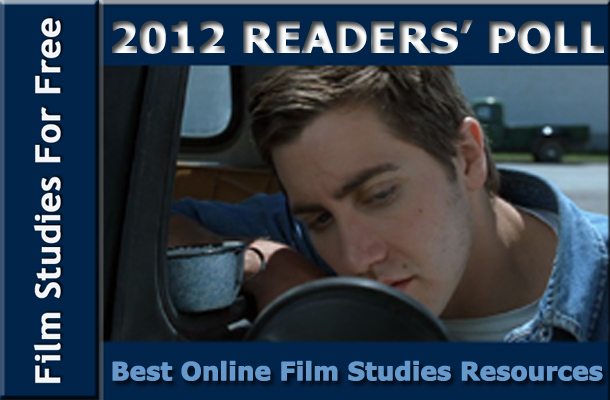Updated December 31, 2012
 |
| Frame grab from Caravaggio (Derek Jarman, 1986). Read Keeley Saunders' article about the tableaux vivants in this film |
'Tis the season to be jolly, apparently, and so Film Studies For Free is happy to oblige with some extremely jolly, serious, and completely free eGifts for the festive season, ones from wise men and women around the world. You can find them liberally scattered in list form, below, under the six headers in bold.
This bountiful blog will be back early in the New Year with its list of Best Online (and Open Access) Film Studies Resources in 2012. So, if you haven't taken part in the readers' poll for that yet, you still have a little time.
In the meantime, FSFF wishes you very happy holidays indeed!
SEQUENCE 1.1, 2012
The first array of eBook publications from SEQUENCE Serial Studies in Media, Film and Music has just been launched — a central element in REFRAME and SEQUENCE’s particular model of academic ePublishing.
You can now read SEQUENCE 1.1 — Steven Shaviro’s magisterial and open access article about a film about the end of world (‘MELANCHOLIA, or, The Romantic Anti-Sublime‘) — in a variety of free eBook formats. Just click here to check them out and download them to your devices.
RE.FRAMING ACTIVISM: Creating the Witness
Leshu Torchin's current research focuses on how screen media bear witness to human rights abuses and genocide in order to mobilise audiences. In her guest post for RE.FRAMING ACTIVISM, Torchin introduces some of the issues that are central to her new book, Creating the Witness: Documenting Genocide on Film, Video, and the Internet. Thanks to Torchin and the book’s publishers University of Minnesota Press, REFRAME has been granted the permission to share the extensive introduction to the book online. You can read it here.
ALPHAVILLE, Issue 4, Winter 2012
Open Theme Edited by Stefano Odorico and Aidan Power
- Editorial By Stefano Odorico and Aidan Power
- Who’s Got the “Reel” Power? The Problem of Female Antagonisms in Blaxploitation Cinema By Melissa DeAnn Seifert, University of Wisconsin-Milwaukee
- Egyptian Film Censorship: Safeguarding Society, Upholding Taboos By Dina Mansour, Scuola Superiore Sant’Anna, Italy
- “I Get Sort of Carried Away, Being So Normal and Everything”: The Oscillating Sexuality of Clare Quilty and Humbert Humbert in the works of Nabokov, Kubrick and Lyne By Emerson Storm Fillman Richards, University of Florida
- Towards an Embodied Poetics of Cinema: The Metaphoric Construction of Abstract Meaning in Film By Maarten Coëgnarts and Peter Kravanja, University of Antwerp
- Film-Thinking and Narrative Indeterminacy By Jimmy Billingham, Independent Scholar
- Image Versus Imagination: Memory’s Theatre of Cruelty in Chris Marker’s La Jetée By Martina Witt-Jauch, Goettingen University
- Anima Animus: Jennifer Jason Leigh’s Bisexual Method in Last Exit to Brooklyn By Ian Murphy, University College Cork
- Film Theory: Rational Reconstructions, by Warren Buckland (2012) Reviewer: Kevin McDonald, Cal State Northridge
- Recording Reality, Desiring the Real, by Elizabeth Cowie (2011) Reviewer: Amy Parziale, University of Arizona (USA)
- The Neuro-Image: A Deleuzian Film-Philosophy of Digital Screen Culture, by Patricia Pisters (2012) Reviewer: Thorsten Botz-Bornstein, Gulf University for Science and Technology, Kuwait
- Motion Capture: Drawing and the Moving Image. Curated by Ed Krčma and Matt Packer
Lewis Glucksman Gallery, Cork, 26 July–4 November 2012 Reporter: Jill Murphy, University College Cork - The Society of Cinema and Media Studies Annual Conference 2012, Boston, USA, 21–25 March 2012 Reporters: Anthony Coman and Missy Molloy, University of Florida
NETWORKING KNOWLEDGE: Journal of the MeCCSA-PGN, Vol 5, No 3 (2012): The Biographical Narrative in Popular Culture, Media and Communication
Editorial The Biographical Narrative in Popular Culture, Media and Communication: An Introduction PDF Matthew Robinson
Articles
- Caravaggio’s cinematic painting: Fictionalising art and biography in the artist biopic PDF Keeley Saunders
- Blurring Gender Boundaries – Masculine Confessional in Celebrity Auto/biographies PDF Hanna Kylloen
- Re-Envisioning the Artist Hero Through Two Cole Porter Biopics PDF Derek Johnston
- Digital Lives: Refiguring the recent and distant pasts in new biographical forms PDF Adam Gallimore
- Depicting a Life Less Ordinary: Fantasy as Evidence for Deconstruction in the Contemporary Film Biopic PDF Carolyn Ellam
- “Sex doesn’t dominate my life at all, really. I think painting does” (David Hockney): the emergence of the queer artist biopic PDF David Bovey
PGN Matters
- Why PGN Matters: PGN, Our Family PDF Xuelian Jin
THE CINE-FILES: A Scholarly Journal of Cinema Studies, Issue 2, 2012
- The Actor’s Vision by Steven Ryben
- Wiping the Dust from Our Eyes by Lauren Newton Glenn
- West of Eden by Duncan Pittman
- “Sex and the City: A Festival Introduction” by Roger Rawlings
- “Wonder Women in the Savannah Film Festival: From the Page to the Screen, and Finally, Beyond” by Alexa Boehringer
- “Chris Marker and the Essay Film: a Presentation by Timothy Corrigan” by Tracy Cox-Stanton
- Panel: A Critical Eye on Film with Dr. Timothy Corrigan, University of Pennsylvania; Dr. Peter Hitchcock, City University of New York; and critic Claudia Puig, USA Today, alongside Dr. Roger Rawlings, Dr. Tracy Cox-Stanton, and Dr. Chad Newsom
- Reviews:







